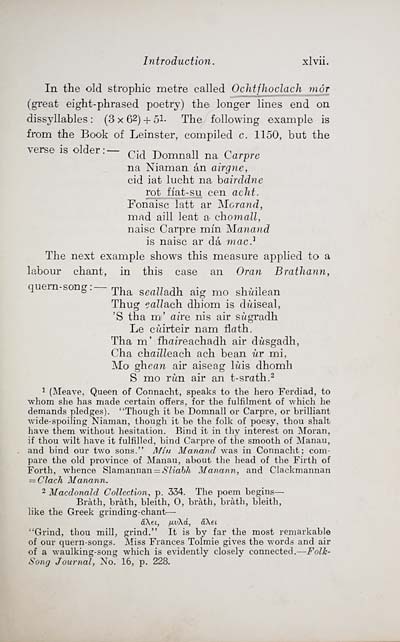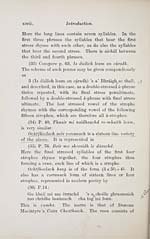Download files
Complete book:
Individual page:
Thumbnail gallery: Grid view | List view

Introduction. xlvii.
In the old strophic metre called Ochtfìioclach mòr
(great eight-phrased poetry) the longer lines end on
dissyllables : (3 x 62) + 51- The following example is
from the Book of Leinster, compiled c. 1150, but the
verse is older.— ^.^^ j^omnall na Carpre
na Niaman àn airgne,
cid iat lucht na hairddne
rot fi'at-su cen acht.
Fonaisc latt ar Morand,
mad aill leat a chomall,
naisc Carpre min Manand
is naisc ar dà mac^
The next example shows this measure applied to a
labour chant, in this case an Oran Brathann,
quem-song:— rj.j^^^ sca^adh aig mo shiVilean
Thug eallach dhiom is dùiseal,
'S tha m' ai're nis air swgradh
Le cùirteir nam flath.
Tha m' fhaireachadh air dùsgadh,
Cha chailleach ach bean -ùr mi,
Mo gh^an air aiseag lùis dhomh
S mo rùn air an t-srath.^
1 (Meave, Queen of Connacht, speaks to the hero Ferdiad, to
whom she has niade certain offers, for the fulfilment of which he
demands pledges). "Though it be Domnall or Carpre, or brilliant
wide-spoiling IS^iaman, though it be the folk of poesy, thou shalt
have them without hesitation. Bind it in thy interest on ÌMoran,
if thou wilt have it fulfilled, bind Carpre of the smooth of Manau,
and bind our two sons." 71//;/ Manand was in Connacht ; com-
pare the old province of Manau, about the head of the Firth of
Forth, whence SlcLmanna.n = Sliabh Manann, and Clackmannan
= Clach Manann.
2 Macdonald Collection, p. 334. The poem begins —
Bràth, bràth, bleith, 0, bràth, bràth, bleith,
like the Greek grinding-chant^
àXei, /xi'Xa, aXfi
"Grind, thou mill, grind." It is by far the most remarkable
of our quern-songs. Miss Frances Tolmie gives the words and air
of a waulking-song which is evidently closely connected. — Folk-
6'ong Journal, No. 16, p. 228.
In the old strophic metre called Ochtfìioclach mòr
(great eight-phrased poetry) the longer lines end on
dissyllables : (3 x 62) + 51- The following example is
from the Book of Leinster, compiled c. 1150, but the
verse is older.— ^.^^ j^omnall na Carpre
na Niaman àn airgne,
cid iat lucht na hairddne
rot fi'at-su cen acht.
Fonaisc latt ar Morand,
mad aill leat a chomall,
naisc Carpre min Manand
is naisc ar dà mac^
The next example shows this measure applied to a
labour chant, in this case an Oran Brathann,
quem-song:— rj.j^^^ sca^adh aig mo shiVilean
Thug eallach dhiom is dùiseal,
'S tha m' ai're nis air swgradh
Le cùirteir nam flath.
Tha m' fhaireachadh air dùsgadh,
Cha chailleach ach bean -ùr mi,
Mo gh^an air aiseag lùis dhomh
S mo rùn air an t-srath.^
1 (Meave, Queen of Connacht, speaks to the hero Ferdiad, to
whom she has niade certain offers, for the fulfilment of which he
demands pledges). "Though it be Domnall or Carpre, or brilliant
wide-spoiling IS^iaman, though it be the folk of poesy, thou shalt
have them without hesitation. Bind it in thy interest on ÌMoran,
if thou wilt have it fulfilled, bind Carpre of the smooth of Manau,
and bind our two sons." 71//;/ Manand was in Connacht ; com-
pare the old province of Manau, about the head of the Firth of
Forth, whence SlcLmanna.n = Sliabh Manann, and Clackmannan
= Clach Manann.
2 Macdonald Collection, p. 334. The poem begins —
Bràth, bràth, bleith, 0, bràth, bràth, bleith,
like the Greek grinding-chant^
àXei, /xi'Xa, aXfi
"Grind, thou mill, grind." It is by far the most remarkable
of our quern-songs. Miss Frances Tolmie gives the words and air
of a waulking-song which is evidently closely connected. — Folk-
6'ong Journal, No. 16, p. 228.
Set display mode to: Large image | Transcription
Images and transcriptions on this page, including medium image downloads, may be used under the Creative Commons Attribution 4.0 International Licence unless otherwise stated. ![]()
| Early Gaelic Book Collections > Matheson Collection > Bardachd Ghaidhlig > (51) |
|---|
| Permanent URL | https://digital.nls.uk/76423122 |
|---|
| Description | Specimens of Gaelic poetry 1550-1900. |
|---|---|
| Shelfmark | Mat.50 |
| Additional NLS resources: | |
| Attribution and copyright: |
|
| Description | Items from a collection of 170 volumes relating to Gaelic matters. Mainly philological works in the Celtic and some non-Celtic languages. Some books extensively annotated by Angus Matheson, the first Professor of Celtic at Glasgow University. |
|---|
| Description | Selected items from five 'Special and Named Printed Collections'. Includes books in Gaelic and other Celtic languages, works about the Gaels, their languages, literature, culture and history. |
|---|

